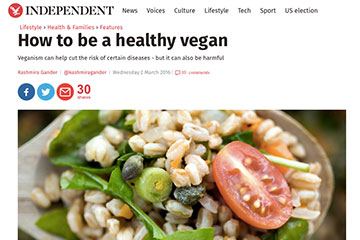If you can look a beef burger in the eye, as it drips with melted cheese from between two soft buns, and happily say you could never eat one again, you may be ready to join the cohort of people turning vegan.
Vegans do not consume any animal products, and their diets instead contain fruits and vegetables, carbohydrates, plant sources of protein such as beans and pulses, and food replacements including soy and almond milk.
The strictest apply this rule to their household items and clothes, while others adopt the ‘flexitarian’ approach – ridding their diets of animal products for weeks at a time.
Those who advocate a vegan diet say that, followed properly, it can cut the risk of developing cancer and heart disease.
As with any diet, with careful planning it is possible to live healthily as a vegan. But those who are inexperienced can become deficient in nutrients, such as calcium, iron and vitamin B12.
Dr Hair Transplant Surgeon at The Private Clinic of Harley Street said that many of her clients experience hair thinning because their diets lack substances such as iron and keratin.
Vegans must therefore ensure that they eat enough leafy greens – such as spinach, kale, cabbage and broccoli – to ensure they are getting enough iron, and should consider taking iodine supplements. If not, they risk developing anaemia, meaning the body produces less red blood cells.
Fortified grains and cereals, meanwhile, top up B12 – which is essential for a healthy nervous system – that are usually found in meats, fish, and other animal products. Beans, wheat, bran and seeds are also good options, as well as dried fruits and nuts.
As for calcium, it isn’t only lurking in cows milk. The substance, which maintains healthy bones and teeth, can be found in fortified drinks; calcium-set tofu, sesame seeds and tahini; pulses; dried fruits like raises. In the UK, the law requires white and brown bread to contain calcium.
However, Dr also warned against consuming too much fresh soy, because while it gives a boost in protein it also contains inflammatory lectins and phytic acid, both of which actually hinder mineral absorption.
The overall message? Do your research because you banish the bacon.
*All images, videos and testimonials are based on the personal experiences of our patients and represent individual body shapes and results. Results may vary from person to person. All testimonials are provided voluntarily by our patients and clients and all photos and videos have been consented to and have not been altered in any way.
If you can look a beef burger in the eye, as it drips with melted cheese from between two soft buns, and happily say you could never eat one again, you may be ready to join the cohort of people turning vegan.
Vegans do not consume any animal products, and their diets instead contain fruits and vegetables, carbohydrates, plant sources of protein such as beans and pulses, and food replacements including soy and almond milk.
The strictest apply this rule to their household items and clothes, while others adopt the ‘flexitarian’ approach – ridding their diets of animal products for weeks at a time.
Those who advocate a vegan diet say that, followed properly, it can cut the risk of developing cancer and heart disease.
As with any diet, with careful planning it is possible to live healthily as a vegan. But those who are inexperienced can become deficient in nutrients, such as calcium, iron and vitamin B12.
Dr Thomy Kouremada-Zioga, Hair Transplant Surgeon at The Private Clinic of Harley Street said that many of her clients experience hair thinning because their diets lack substances such as iron and keratin.
Vegans must therefore ensure that they eat enough leafy greens – such as spinach, kale, cabbage and broccoli – to ensure they are getting enough iron, and should consider taking iodine supplements. If not, they risk developing anaemia, meaning the body produces less red blood cells.
Fortified grains and cereals, meanwhile, top up B12 – which is essential for a healthy nervous system – that are usually found in meats, fish, and other animal products. Beans, wheat, bran and seeds are also good options, as well as dried fruits and nuts.
As for calcium, it isn’t only lurking in cows milk. The substance, which maintains health bones and teeth, can be found in fortified drinks; calcium-set tofu, seasame seeds and tahini; pulses; dried fruits like raises. In the UK, the law requires white and brown bread to contain calcium.
However, Dr Zioga also warned against consuming too much fresh soy, because while it gives a boost in protein it also contains inflammatory lectins and phytic acid, both of which actually hinder mineral absorption.
The overall message? Do your research because you banish the bacon.









